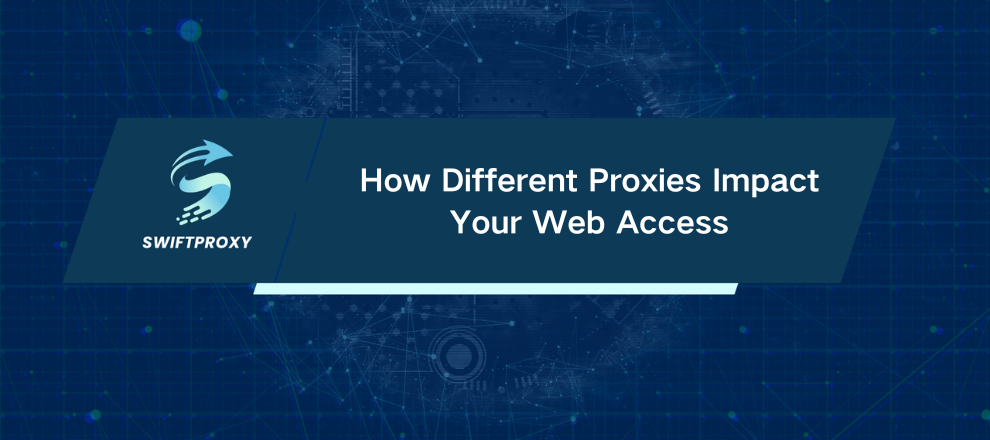How Different Proxies Impact Your Web Access

You want to browse anonymously. Securely. Efficiently. Simple, right? Not quite. The internet has layers. Restrictions. Blocks. Censors lurking behind every click. That's where proxies come in.
But proxies aren't all the same. Confusing? Yes. Vital? Absolutely. Picking the wrong type can slow you down, expose your identity, or simply fail to get the job done. So, how do you cut through the noise and find the right fit? Let's break down the key proxy types — no fluff, just what matters — and arm you with the insight to make a smart choice.
HTTPS Proxy
Think of HTTPS proxies as the bodyguards of your online data. They set up encrypted tunnels between you and your target website. This means your data is cloaked in security, unreadable to prying eyes. The website you connect to only sees the proxy's IP, not yours.
Use cases? Plenty.
Hide your identity and location with airtight privacy.
Bypass geo-blocks or censorship like a pro.
Scrape data from HTTPS sites that guard their content fiercely.
Test your site's performance across different regions without exposing yourself.
If encryption and security are priorities, HTTPS proxies are your go-to.
HTTP Proxy
HTTP proxies speak plain web. They handle standard HTTP traffic but don't encrypt data like HTTPS proxies do. Simple but effective for less sensitive tasks.
They work well when you want to:
Keep your identity under wraps on sites without heavy security.
Circumvent basic geo-restrictions.
Scrape content where bot protection is minimal.
Run quick performance checks on your web properties.
If you don't need the extra layer of encryption, HTTP proxies get you there faster and cheaper.
SOCKS5 Proxy
SOCKS5 is the wildcard. It operates at a lower network level and supports multiple protocols — TCP and UDP — meaning it's versatile. Plus, it allows various authentication methods for enhanced control.
Why choose SOCKS5?
It hides your IP and location with stealth.
Bypass geo-fences and censorship seamlessly.
Handle sites with tight anti-bot defenses by mimicking regular users.
Test across diverse networks and regions with minimal friction.
Versatility meets security. SOCKS5 is perfect when you need flexibility without compromising privacy.
Public Proxy
Free and easy to find. But beware — public proxies come with baggage.
They're shared by anyone, anywhere. Reliability? Spotty. Speed? Unpredictable. Security? Minimal.
You might get away with:
Hiding your IP for low-stakes browsing.
Getting around basic geo-blocks.
Scraping sites with weak defenses — if you're lucky.
Quick and dirty performance tests.
For serious work, public proxies are a gamble you probably don't want to take.
Private Proxy
Exclusivity pays off here. Private proxies are reserved for you—or a very limited group—meaning better speed, stability, and security.
They shine in:
Locking down your identity and location.
Navigating geo-restrictions with confidence.
Scraping data where anti-bot systems are vigilant.
Testing websites with accurate regional insights.
If reliability and control are key, private proxies deliver.
Shared Proxy
Shared proxies split the cost by serving multiple users simultaneously. The trade-off? IP addresses get traffic from several devices at once.
Use cases include:
Cutting proxy expenses without sacrificing basic functionality.
Protecting your identity in casual browsing.
Getting past some geo-blocks.
Scraping sites with moderate security.
If budget is tight but you still need proxy benefits, shared proxies offer a middle ground.
Where to Get Secure and Fast Proxies
Knowing your proxy types is only half the battle. You need a provider that delivers on speed, reliability, and support.
Swiftproxy stands out. Their global proxy network covers residential, mobile, and datacenter proxies with high success rates and technical precision. Whether it's web scraping, brand protection, or online privacy, Swiftproxy has you covered.
Their scraper API? It handles CAPTCHAs, IP blocks, and JavaScript rendering like a champ. Plus, their flexible pricing means you pay for what you use—monthly IP plans or pay-per-GB options.
Dashboard controls let you rotate IPs, change geolocations, and track usage—all without fuss. Need support? Their team is ready to jump in.
Final Thoughts
Choosing a proxy isn't guesswork. It's strategy. Match your goals with the right proxy type. Factor in security, reliability, and budget. And partner with a provider that delivers on promises, not just sales pitches.

















































